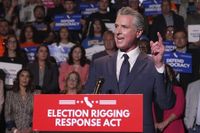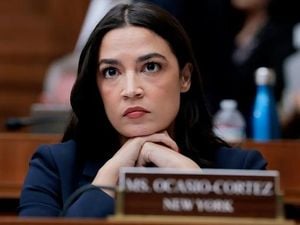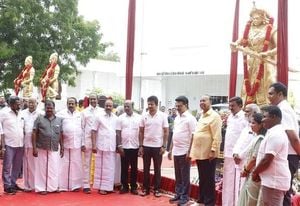California Governor Gavin Newsom has once again found himself at the center of a social media storm, this time by deploying a provocative blend of parody and political trolling aimed at one of Donald Trump’s most outspoken celebrity supporters, Kid Rock. The episode, which unfolded over the weekend of August 17, 2025, on X (formerly Twitter), has ignited debates about the ethics of political satire in the age of artificial intelligence, and raised questions about Newsom’s evolving public persona as he quietly positions himself for a potential 2028 presidential run.
It all began on Sunday, August 17, when the Gavin Newsom Press Office posted a pair of AI-generated images intended to lampoon both right-wing figures and the viral tactics of former President Trump. The first image depicted Kid Rock, conservative commentator Tucker Carlson, and the late professional wrestler Hulk Hogan as literal angels—halos and wings included—accompanied by the cheeky caption, "so nice," a clear spoof of Trump’s penchant for sharing AI-altered images of his political allies (as reported by MLive and The New York Sun).
But it was the second image that truly set the internet ablaze. Styled in a patriotic Uncle Sam motif, the AI-generated picture showed Kid Rock pointing at the viewer, emblazoned with the slogan, "Kid Rock wants you to support Gavin Newsom." The post quickly went viral, racking up approximately six million views by August 19, according to The New York Sun. Newsom himself retweeted the image, adding the phrase, "I accept," and signing it with his initials, GCN—a direct nod to Trump’s own social media habits, particularly his 2024 reposting of an AI parody showing Taylor Swift in a "Swifties for Trump" t-shirt, which Trump had also captioned, "I accept!"
The intent behind Newsom’s posts was unmistakable. By mimicking Trump’s digital bravado and weaponizing AI-generated satire, the California governor appeared to be testing whether such trolling could boost his political brand or, conversely, leave him vulnerable to accusations of hypocrisy. As The New York Sun observed, "the governor’s embrace of trolling tactics will grow his brand or expose him to charges of hypocrisy." The move was especially notable given Newsom’s recent legislative crusade against AI deepfakes in political advertising—a campaign that had just suffered a setback when a federal judge struck down his signature Defending Democracy from Deepfake Deception Act two weeks prior, citing First Amendment concerns.
Just last September, Newsom had boasted on X about banning manipulated media in California. "You can no longer knowingly distribute an ad, or other election communications that contain materially deceptive content—including deepfakes," he declared at the time. The legislative push was, in part, a response to tech mogul Elon Musk retweeting an altered ad featuring Vice President Harris. Newsom had written, "Manipulating a voice in an ‘ad’ like this one should be illegal." These statements, now juxtaposed with his own gleeful use of AI satire, have not gone unnoticed by critics who see a contradiction in his stance.
The immediate response to Newsom’s Kid Rock post was confusion—and then outrage—among the musician’s fan base. Many of Kid Rock’s 1.3 million followers on X were left scratching their heads, unsure whether the image was a genuine endorsement or an elaborate joke. The ambiguity only fueled engagement, as fans flooded the platform with calls for Kid Rock to clarify his position.
The rocker, whose real name is Robert James Ritchie and who has long been a vocal supporter and friend of Donald Trump, did not disappoint. Late on Monday night, August 18, Kid Rock fired back in classic irreverent style. Quoting Trump’s favorite nickname for the California governor, he wrote, "The only support Gavin Newscum will ever get out of me is from DEEZ NUTZ." The phrase "Deez Nuts," as The New York Sun notes, is itself a nod to political satire—a reference to the 2016 mock presidential campaign launched by then-15-year-old Brady Olson, which briefly captured the nation’s imagination and underscored the blurred lines between genuine political discourse and internet-fueled parody.
Kid Rock’s retort quickly became a talking point in its own right, with many observers noting the layers of trolling at play. As MLive reported, "Rock is a friend and supporter of President Trump," and his response was in keeping with his brash, anti-establishment persona. But the exchange also highlighted a deeper tension: while Americans are accustomed to Trump’s blend of showmanship and political theater—often dismissing him as part politician, part stand-up comic—Newsom has cultivated an image of the straight-talking, policy-driven leader. By descending into the mud of meme warfare, some critics argue, Newsom risks undermining his own credibility.
Yet for Newsom, the gamble may be a calculated one. As The New York Sun points out, "Newsom’s trolling tactics on X are part of his strategy to raise his profile in the 2028 Democratic presidential field." In an era where viral content can make or break political fortunes, the governor seems intent on meeting his rivals on their own turf, even if it means embracing the very tactics he once decried. The question, of course, is whether voters will reward him for his digital agility or punish him for perceived duplicity.
The timing of Newsom’s social media blitz is also telling. The governor has recently drawn Trump’s ire for launching a California redistricting campaign in response to a potential move by Texas GOP lawmakers to redraw congressional maps—a clear sign that he’s willing to take the fight to Republican strongholds, both online and off. By leveraging parody and AI-generated imagery, Newsom is signaling that he’s not afraid to play hardball, even if it means blurring the lines between satire and serious political messaging.
The episode also raises important questions about the future of political communication in the age of artificial intelligence. With deepfakes and manipulated media becoming increasingly sophisticated—and increasingly difficult to detect—politicians and voters alike are grappling with the implications for democracy and public trust. Newsom’s own legislative efforts to police AI-generated content, now partially undone by the courts, reflect the broader struggle to balance free speech with the need for electoral integrity.
For now, the verdict on Newsom’s trolling remains uncertain. Some see it as a savvy adaptation to the realities of modern campaigning, a way to cut through the noise and connect with voters who have grown cynical about traditional politics. Others view it as a risky departure from the norms of statesmanship, one that could backfire if the governor is perceived as just another player in the endless game of online one-upmanship.
What’s clear is that the battle for hearts, minds, and retweets is only just beginning. As politicians like Newsom and Trump continue to push the boundaries of digital engagement, the American public will have to decide where parody ends and politics begin—and whether the next president will be chosen not just at the ballot box, but in the meme wars of social media.




